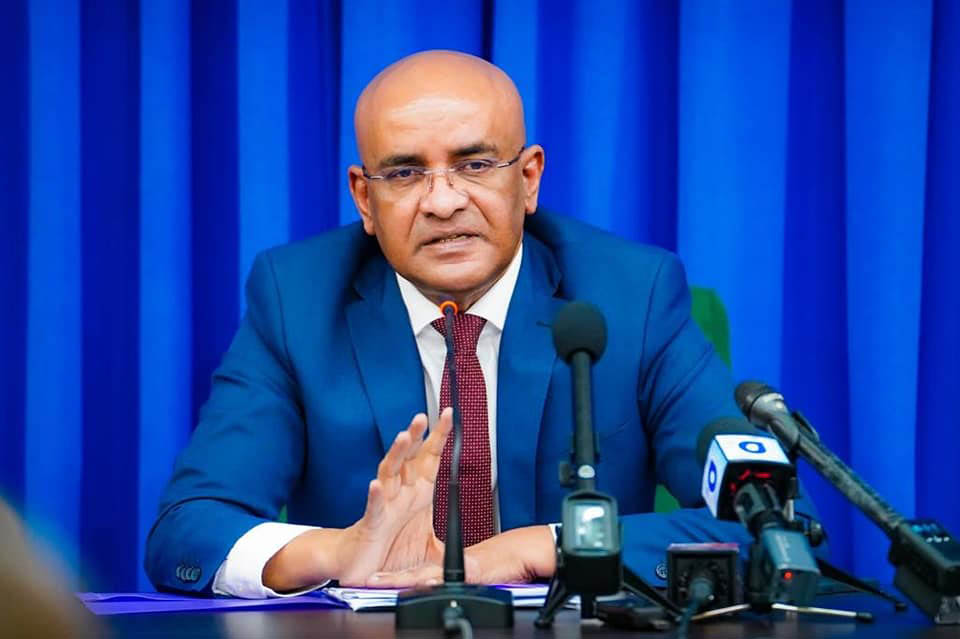Vice President Bharrat Jagdeo on Friday shared a proposal by government to remove the names of dead persons from the National Register of Registrants.
The main opposition APNU+AFC has contended that the voters’ list derived from the register is bloated with the names of dead people and that many of those persons voted in the 2020 elections, although there has been little to no evidence to support the latter claim.
Discussing a proposed new methodology to sanitise the register at a news conference on Friday, Jagdeo said that the Chief Election Officer (CEO) would have to secure a list of all the dead people, to date, from the General Register Office and compare it to the list of registrants. Additionally, the CEO would be required to do so annually.
“…GECOM [Guyana Elections Commission] has the right now to remove people from the list based on maybe a death certificate. So we want to make the process transparent so GECOM should do that on a large scale and then by law they must share the list with all the political parties and publicise the list of dead people in the newspapers.
“We want to put that into the law so every time they remove dead people, they must share this with all the parties in Guyana and publish it in the newspaper. It’s not just GECOM [doing it] on their own,” Jagdeo said.
In November last year, the government released the proposed amendments to the Representation of the People Act (RoPA) and set a six-week period for review, comment and propose additional amendments. That process ended mid-December with no announcement of an extension.
Additionally, the government did promise to release draft amendments to the National Registration Act.
In January, Minister of Parliamentary Affairs and Governance Gail Teixeira told Stabroek News that the process for submission of comments and additional amendments was still ongoing as the government was in the process of drafting changes to the National Registration Act.
“RoPA consultation is not completed as yet. It is still ongoing and as I said earlier that the process will keep running because we have another piece of legislation to amend and that is the Registration Act. That is being drafted and the process cannot go forward until that is completed,” she had explained.
When asked about a deadline for drafting the amendments to the Registration Act, the minister said that the completion of that process lies solely with the drafters. She also related that the government also invited the diaspora to submit comments and propose additional amendments to RoPA but could not say how they intend to treat the submissions that they have received.
The government is yet to hold any public education session on the proposed amendments which speaks to a number of new additions to RoPA. Also, the amendments were drafted without input from GECOM.
On Friday, Jagdeo told reporters that although the government had intended for the six-week period for the comments on RoPA, the process still remains open. He added that they have received the most “substantive” number of comments from GECOM and a civil society body, the Electoral Reform Group (ERG).
The Vice President added that Minister Teixeira and Attorney General Anil Nandlall have been ordered to assemble a team and meet with both GECOM and ERG to “work on the legislation.”
“We have gone through all of the other comments we received [and] the final draft will be ready once they have completed that and we will table it in the Parliament,” he said.
Jagdeo added that he is hopeful the opposition will participate in the process once the bill is laid in the National Assembly as he noted that they have been calling for comprehensive electoral reforms but did not submit comments on RoPA draft amendments.
“…the legislation will do a number of things [but] the primary purpose of the legislation will be to take away discretion from the Chief Election Officer and to make more transparent, the entire process from registration all the way to the declaration of results,” he said while highlighting a number of issues the government identified with the 2020 elections process.
He explained that the CEO would also be required to publish the elections conduct manual along with list of polling places in an effort to make the process as transparent as possible.
“The manual now for the conduct of elections would have to be publicized in the newspapers [and] shared with all the political parties long before the election so presiding officers know their responsibilities,” he said.






